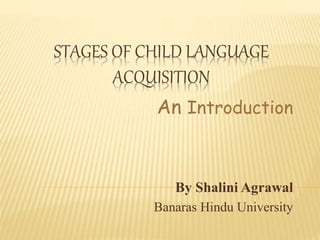
Stages of child language acquisition.
- 1. STAGES OF CHILD LANGUAGE ACQUISITION An Introduction By Shalini Agrawal Banaras Hindu University
- 2. INTRODUCTION: Language development begins from the very first day after birth. By the age of 5, the child knows most of the system of language and it continues even after the age of 5. Research indicates babies listen to their mother's voice during the last few months of pregnancy. Every child acquire a language as a native language with equal ease. ‘How does a child learn his/her languages well in such a short time? And what is the course of language learning?, Developmental Psycholinguistics, has attempted to answer the these questions over the past 30 years, and also provided us with considerable insight into the how and why of the first language acquisition’ (Kess, 1992).
- 3. INTRODUCTION: (Contd.) Languages are acquired in the predictable stages as the behavior develops. ‘They do different in their onset and rate of development but the chronology seems to remain constant.’ (Kess, 1992) Acquiring language is learning a game. One must learn the rules of the game. Children also learn to improve and enhance their behavior for a good member of a society.
- 4. HISTORICAL OVERVIEW: Diary studies: (from 1877- 1930) Language development studied through diary studies by recording the speech of a child. Parents daily record the speech and maintain a diary. Large sample studies: (from 1930- 1957) Instead of collecting data of a single child they collect data from a large number of children at a certain stage. Linguistic Studies: (from 1957 onwards) Instead of focusing just at the utterance of a child, they tried to understand the rules behind it.
- 5. BASIC REQUIREMENTS: Stork and Widdowson (1974) points out two important factors involved in language acquisition: Firstly, an innate human potential for the acquisition of a language. Secondly, a linguistic environment for a child stimulated by linguistic input.
- 6. MAIN STAGES OF CHILD LANGUAGE ACQUISITION: Stages Typical Age 1. The Pre-linguistic Period Birth - 10 months 2. The Holophrastic Period 12 months - 18 months 3. The Telegraphic Period 2 years - 3 years 4. The Complex Period 3 years - 5 years
- 7. 1. PRELINGUISTIC PERIOD: (Birth- 10 months) From the moment of birth, a child discriminate speech from other sounds. Start discovering phonemes. 1 month: start crying or producing sounds in order to convey several information. Hunger cry Angry cry Pain cry Cooing starts in response to pleasure. This is a universal stage. 6 months: babbling stage, producing syllables like ba-ba-ba 9-10 months: start using intonation patterns and also rephrase babble that seems as if they are words. e.g. baba, mama, dada etc.
- 8. 2. THE HOLOPHRASTIC PERIOD (12 months-18 months) 12 months: single word phrase stage. Communication done with single words in order to convey complex message. Example: a word “tedda” could mean: ‘I want my teddy, here is my teddy, Where is my teddy?’ Naming person, object and places like cookie, dog etc. Vocabulary moved to 30 words. Improved pronunciation. Says ‘no’ meaningfully. Start understanding what is being said like ‘come here’, ‘stop it’ etc.
- 9. 3. THE TELEGRAPHIC PERIOD: ( 2 years - 3 years) 2 years: two word phrase stage. Child uses minimum words to convey meaning of a whole sentence. Lack of function words in communication but recites familiar nursery rhymes. 30 months: start acquiring rules of syntax. Demonstrating semantic relations with two words. e.g. Semantic Relations Examples Agent + Action Mumma sit Agent Object Papa car Action + Object Eat mango Action + Location Go park Object + Location Teddy + floor
- 10. 4. THE COMPLEX PERIOD: (3 years – 5 years) By 5 years: acquisition becomes slow but vocabulary continues to grow. Developing morphology: start using functional words. Overgeneralization of rules: the child applies –s to the words like ‘foots’ or ‘mans’. Developing syntax: start forming complex sentences. Forming wh- questions like what, where, who, when etc. Forming negative sentences. e.g. I was not eating Pizza. Developing semantics: overextend the meaning of a word on the basis of shape and size. Example, use ball to refer all round things like an apple, an egg or a grape.
- 11. CONCLUSION: There is no clear-cut answer as to how language acquisition take place. Language acquisition tend to run parallel to the physical development. Though there is no correlation between these two. Generally, babbling occurs around the time when baby begin to sit up. They utter single word just before they start to walk. Grammar becomes complex when hands and fingers co- ordination develops.
- 12. REFERENCES: Mathews, A. (1996). Linguistic Development. Kess, J. F. (1992). Psycholinguistics: psychology, linguistics, and the study of natural languages. Amsterdam. Rahimpour, M. ‘Developmental stages of child Language’. Journal of Faculty of Letters and Humanities, vol. 47, no. 190. (pp 57- 70).
- 13. THANK YOU!!!